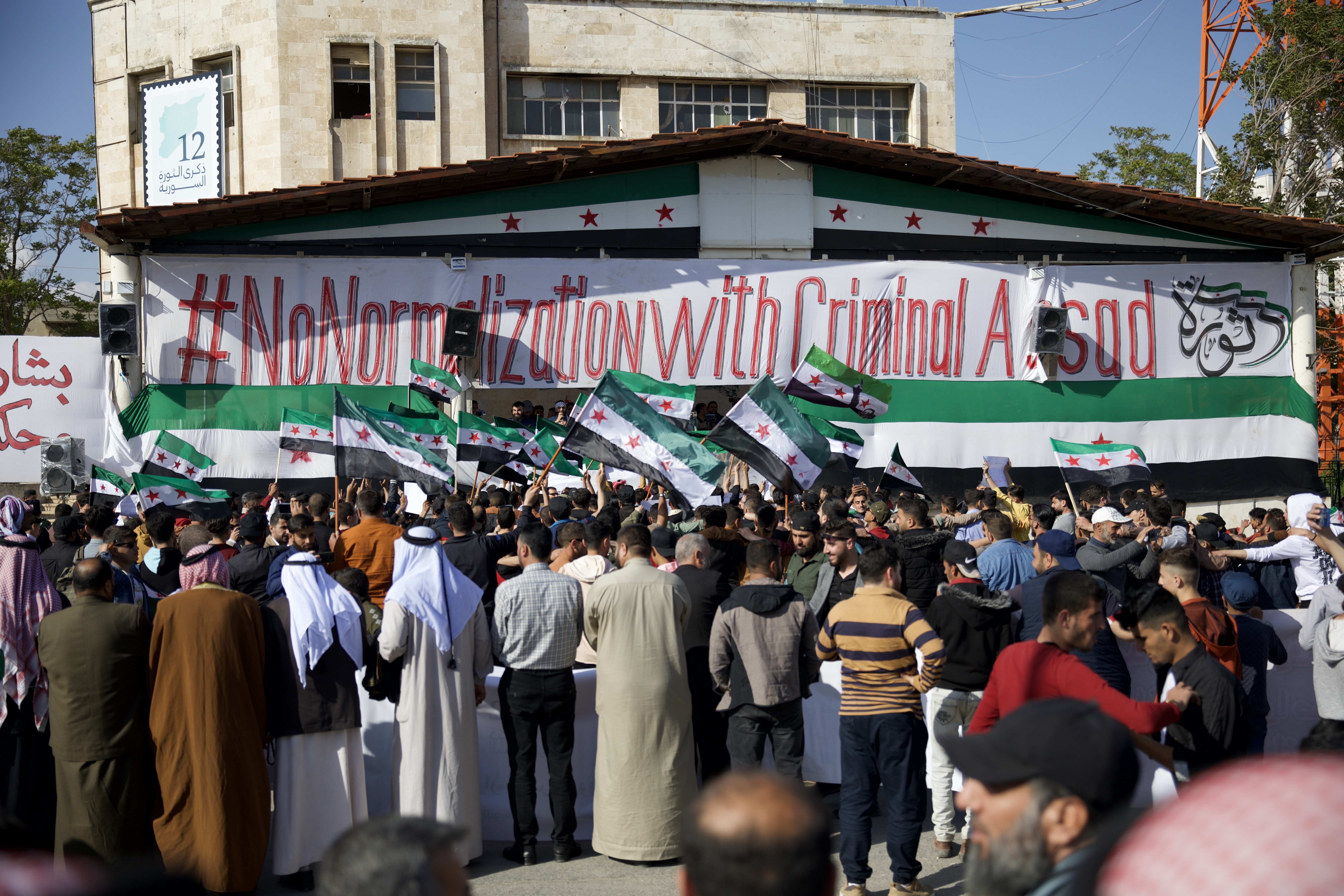
Hundreds of people have taken to the streets of several cities in northwestern Syria to protest against warming ties between some Arab countries and President Bashar al-Assad.
The biggest demonstration took place on Sunday in Idlib, a stronghold of forces opposed to al-Assad, while smaller groups gathered in Azaz – a refuge for Syrians who fled from other parts of the country amid the 12-year war – and Tal Abyad, a town on the Turkey-Syria border, among other locations in the country’s northwest.
Small groups of people also staged protests in several European cities, including Amsterdam, Berlin and Vienna.
مظاهرة في مدينة #إدلب تحت شعار #لا_للتطبيع_مع_الأسد_المجرم #nonormalizationwithcriminalassad
الفيديو كامل:https://t.co/CqPGCkl3Am@DrZaineddin pic.twitter.com/Uj8YNB5CSw— أنس المعراوي anasmaarawi (@anasanas84) April 23, 2023
Translation: Demonstration in the city of #Idlib under the slogan #nonormalizationwithcriminalalassad. Complete video: youtu.be/6MaM9cu0-9Q
“We went out in this demonstration to deliver a message to the Arab countries that have failed the Syrian people and the Syrian revolution,” an activist displaced to Idlib from the southern city of Deraa told Al Jazeera.
“The Syrian revolution began as an orphan and is still an orphan,” he added.
Syria’s civil war broke out after al-Assad’s repression of peaceful anti-government demonstrations in 2011 escalated into a deadly conflict that pulled in foreign powers and global armed groups.
More than half a million people have been killed and about half of the country’s pre-war population has been forced from their homes.
Rebel-held Idlib is home to about three million people, half of them displaced by the war.
مظاهرة في العاصمة النمساوية فيينا تحت شعار "لا للتطبيع مع الأسد المجرم" #لا_للتطبيع_مع_الأسد_المجرم #nonormalizationwithcriminalassad pic.twitter.com/GG0qsoj2OU
— نبيل العثمان Nabel Alothman (@Nabel_Alothman1) April 23, 2023
Translation: A demonstration held in the Austrian capital, Vienna, under the slogan #nonormalizationwithcriminalassad.
Reviving ties
Some demonstrators held signs, including one that read: “Whoever forgives and reconciles [with al-Assad] is a criminal traitor … and is like him.”
After the war broke out in Syria in 2011, Saudi Arabia and several other Arab countries severed ties with al-Assad’s government, with Riyadh long openly championing al-Assad’s removal, backing Syrian rebels in earlier stages of the war.
But regional capitals have gradually been warming to al-Assad as he clawed back most of the territory lost to rivals, with crucial backing from Russia and Iran.
Protesters said reconciliation with al-Assad can take place only after the Syrian president is prosecuted and all detainees are released from prison. They also stressed that the return of displaced Syrians cannot take place as long as al-Assad remains in power.
“Normalisation with the al-Assad regime is a betrayal of the revolution,” Khaled al-Youssef, an immigrant who lives in a camp in northern Syria, told Al Jazeera.
“Anyone who normalises with Bashar al-Assad is a partner in killing Syrians,” he added.

The United Arab Emirates, which re-established ties with Syria in late 2018, has been leading the charge to reintegrate Damascus into the Arab fold.
In a landmark agreement in March, Saudi Arabia and Syria’s ally Iran decided to resume diplomatic ties, paving the way for a flurry of diplomatic activity.
On Tuesday, Saudi Foreign Minister Prince Faisal bin Farhan Al Saud met al-Assad in Damascus, marking the most significant step yet towards ending Syria’s regional isolation. The visit came less than a week after Syria’s top diplomat Faisal Mekdad visited the kingdom.
Also this month, diplomats from nine Arab countries met in the Saudi city of Jeddah to discuss ending Syria’s long spell in the diplomatic wilderness, while Mekdad visited Algeria, Tunisia and Egypt in a diplomatic push.







